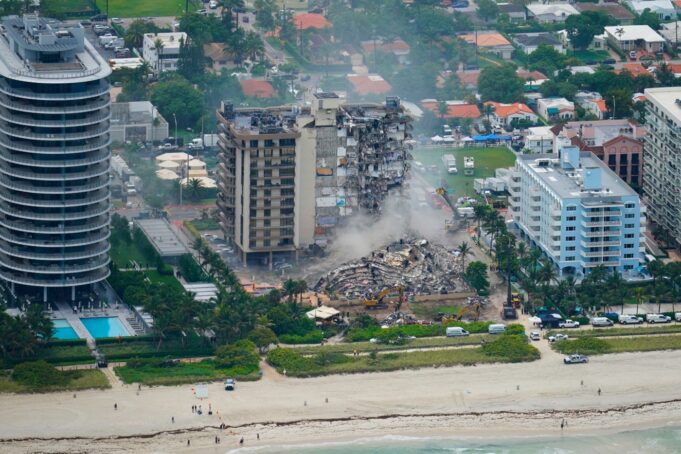A nightmare scenario looms for condo buyers applying for certain types of federally-backed mortgages. If you are selling or are looking to buy an attached condominium in a community with five or more attached units, conventional financing from mortgage giants Fannie Mae and Freddie Mac may soon become elusive.
Beginning Jan. 1 for Fannie and starting Feb. 28 for Freddie, the mortgage giants are putting the screws to a required HOA questionnaire. New questions ask applicants about the structural integrity of the community and whether any code violations are anticipated. No doubt, Fannie and Freddie’s updated lender mandates are in response to the Florida condo tower that killed 98 people last June 24 .
Years of deferred maintenance at the Champlain Towers in Surfside caused the 12-story building to collapse. Answering the agencies thoroughly and completely could force lenders to decline a mortgage application. (Remember: Mortgage lenders fund a loan, and then may sell it to Fannie or Freddie).
“Yes, lenders are declining projects even for a simple special assessment for repairs now. Things are just trickling in right now because the guidance started January 1,” said one condo project approval expert, who asked to remain unnamed because he’s not the media spokesman for his company.
“Soon enough we’ll see the effects hit all the condo market. I’ve only seen it affect projects with major issues at this point; meaning (the project) has code violations and millions of dollars of repairs underway.” Answering these questions honestly or possibly with a guess could bring liability in the form of future lawsuits against HOA stakeholders such as the property management company, board members, inspectors, engineers and the association. If the questionnaire isn’t completely answered because the answers are unknown or undetermined, it might mean the purchase or refinance gets torpedoed.
Here is a sprinkling of questions included in Fannie Mae’s Form 1076 condominium project questionnaire (posted December 2021 and updated to eight from five pages):
Q: Is the HOA aware of any deficiencies related to the safety, soundness, structural integrity, or habitability of the project’s building(s)?
My reaction: If management didn’t know about any deficiencies, for example, and answered as such, should they have reasonably known these calamities could come up later?
Q: Is it anticipated the project will, in the future, have such violations (zoning ordinances, codes, etc., which are related to safety, soundness, structural integrity, or habitability)?
My reaction: For the love of peace, how could one possibly determine if yet-to-be-written, jurisdictional codes trigger new violations in the condo complex? These dubious questions could be akin to a winning lottery ticket for any attorney who lives in the world of HOA litigation. Why is this so problematic? The nation has a huge community of really old condos and many of them are backed by Fannie Mae and Freddie Mac mortgages.
The U.S. has as many as 156,000 condo associations and cooperatives housing between 27 and 32 million Americans, according to the Community Associations Institute. “Seventy percent of all condo loans in the U.S. are Fannie or Freddie (backed),” said Dawn Bauman, senior vice president of government affairs at CAI. “Sixty to 70% of all condo complexes are more than 30 years old.”
Fannie Mae has a published list of 82 “unavailable” California condo-projects including the Marina City Club in Marina Del Rey, which has $80 million to $140 million in needed repairs according to a report last year . That a 10-acre complex is one of nearly 1,000 “unavailable” condo projects nationwide. To Fannie Mae, unavailable means a property is ineligible for purchase by the agency. One mortgage executive told me Fannie is making the rounds, emphasizing these new condo questions during lender visits. So, don’t be surprised if that unavailable list explodes as Fannie collects more intel.
To be fair, Fannie and Freddie need to dig more deeply to assess and consider condo structural risk before purchasing those mortgages from lenders. The mortgage giants also may disqualify a condo community for other reasons, such as a lack of budget reserves. If your loan is denied over the Fan or Fred HOA certification answers, you may be able to get funded on what the industry calls a non-warrantable loan. You should expect to pay perhaps one-half to one point higher in rate than conventional financing. You might also have to provide a larger down payment or have more remaining equity compared with Fannie-type requirements.
But buyer beware: Non-qualified mortgage lenders that offer the exotic non-warrantable condo mortgages are not a loan approval shoo-in either. For example, California-based LendSure has a condo guidance checklist to help determine investor risks. The common three items it looks at are investor concentration (how many rentals are in the complex), single investor (does one person or entity own a bunch of the units), and litigation against the condo complex, according to Joe Lydon, co-founder, and managing director of LendSure. Why so much deferred maintenance? Unit owners are often resistant to increased HOA fees or special assessments for repairs and updates. Condo complex building inspections can run $15,000 to $50,000 depending on the number of units, according to Bauman.
“Community Associations Institute is lobbying for laws mandating reserve studies and building inspections,” said Bauman. CAI is also asking Fan and Fred to give HOAs more time to be able to address so many of the new HOA questions. “Five years to ramp-up the requisite building inspections.” Freddie Mac rate news The 30-year, fixed-rate averaged 3.56%, its highest rate since March 2020 and up 11 basis points from last week. The 15-year fixed rate averaged 2.79%, up an eye-popping 17 basis points from last week. The Mortgage Bankers Association reported a 2.3% increase in mortgage application volume from the previous two weeks.
Bottom line: Assuming a borrower gets the average 30-year fixed rate on a conforming $647,200 loan, last year’s payment was $279 less than this week’s payment of $2,928. What I see: Locally, well-qualified borrowers can get the following fixed-rate mortgages without points: A 30-year FHA at 3.125%, a 15-year conventional at 2.75%, a 30-year conventional at 3.5%, a 15-year conventional high balance ($647,201 to $970,800) at 3.25%, a 30-year high balance conventional at 3.5% and a jumbo 30-year fixed at 3.375%.
Note: The 30-year FHA conforming loan is limited to $562,350 in the Inland Empire and $647,200 in LA and Orange counties. Eye catcher loan program of the week: A 30-year fixed at 3% with two-points cost.
Written By Jeff Lazerson for The OC Register | Jeff Lazerson is a mortgage broker. He can be reached at 949-334-2424 or jlazerson@mortgagegrader.com .











